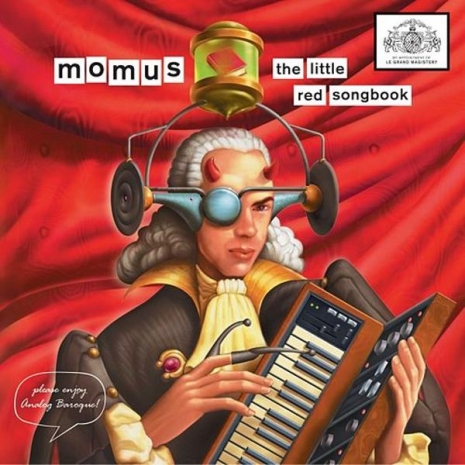
I first became aware of Momus back in 1994. I was standing in front of the goodie closet at the Tokyo offices of Nippon Columbia, the big Japanese record company. I was greedily loading myself up with as much free product (mostly jazz CDs) as I was going to be able to carry in my luggage back home to Los Angeles when I noticed the extravagantly packaged CD of his Timelord album with its distinctive Pierre et Gilles cover portrait and slipcase.
“What’s this?” I quizzed one of the record execs who spoke better English than the others.
“Ah…it’s…ah… ah… music for gay people!” he said laughing, after thinking about it for a moment.
I took this to mean “witty” “camp” or simply “in the same ballpark as Marc Almond” and so I asked him “Can I have this, too, then?”
The following day I saw who I immediately realized was this very same Momus character—he stood out in the context of Japan, as any non-Japanese tends to in Tokyo—and although he seemed rather effete and fashionable, he was with a super hot Japanese girl and he didn’t seem to be gay at all. (In retrospect, I think the record exec had heard “The Homosexual” a 1988 song by Momus—but not about him—and just assumed something that a language barrier didn’t help with. Having said that, he wasn’t really that far off either and I did know vaguely what he meant, which is the important thing anyway.)
Timelord is a strange, but intriguing album, a love letter sent by Momus (real name Nick Currie) across time and space to just one person—a young woman of Bangladeshi descent he’d fallen in love with whose parents had her shipped off to an arranged marriage when they found out about him. Currie described it as “the album that shot itself in the foot” but there’s a lovely quality to it.
Like The Visitor in The Man Who Fell To Earth who hopes his wife on her distant planet will hear his music on the radio, Momus hopes this music will cut through the static interference of fundamentalist Islam to reach Shazna.
The song that really stood out to me first on Timelord was “Enlightenment,” a number that waxed poetic about a certain sexually promiscuous person—this would be Momus, about to settle down in a serious relationship—sitting in a doctor’s office waiting for the results of his AIDS test.
I realize that this doesn’t sound romantic, but it really is when you think about what he’s singing:
But tell me you’ll be there
When I’m knocked out flat
With a drip feed in my arm
And tell me you’ll be there
When the swansong starts to fade
And when a life support machine
Supports me in a coma you’ll be there
And when I’m just a cabbage save me from the spadeSo tell me you’ll be there
If I ever find
I’ve only got one kidney left
And tell me you’ll be there
When I’ve only got one eye
And say that you’ll still be my baby
When a wheelchair is my chair
You’ll be there upon the day I dieAnd tell me you’ll be there
When my head’s on backwards
And my skin is turning green
You’ll be there
When my brain has gone to sand
And tell me you’ll still be my baby
When my guts are on the floor
And when I’m catatonic
I’ll still be your man
A terribly post-modern take on the Beatles “When I’m 64,” isn’t it?
The lyrics were unlike anything else I think I’d ever heard before in a pop song. Wordplay and sentiment so intelligent, so unexpected, so idiosyncratic. So wonderfully and unabashedly smart and literate and funny. And morbid!
Momus is an absolute chameleon as a songwriter and sheds musical styles from album to album—vaudeville, New Wave, synthpop, Brechtian cabaret, Baroque, acid house, folk—as I would soon find out fanning through his catalog, which at this point includes over 30 (mostly fantastic) full length albums. To be sure, Currie has a “thing” that he does—it’s very consistently him, but also ever evolving, too.
Truly there is no one even remotely like Momus on the music scene today. The man is brilliant, a global treasure and the greatest songwriter that Scotland has ever produced, but his profile has remained stubbornly obscure, much to the consternation of his fervent, but admittedly small, fanbase. Momus is bigger in Japan, but he’s probably not all that big there, either. As the man himself once said “In the future everyone will be famous for fifteen people.” It’s ridiculous that he’s not much better known, and widely revered, but I still envy anyone just discovering his music anyway.

Momus rendered in watercolors for the cover of El Pais newspaper’s magazine by Jose Manuel Hortelano-Pi
A grand new three CD Momus retrospective, selected by the artist himself and spanning some 30 creatively fertile years, Pubic Intellectual, An Anthology 1986-2016 (out now on Cherry Red and streaming on Spotify) is the perfect place to start if you find yourself curious about this most singularly singular of musical entertainers. But because I want to make it easy on you, I’ve selected a few of my own very favorite Momus tracks and performances for your listening enjoyment and embedded them here, courtesy of Cherry Red.
Personally I prefer what would now be termed, I suppose, “mid-period” Momus, but this is not to say that he’s ever been any less than at the height of his powers throughout his prolific career. His most recent material is just as good and just as inspired as the music he produced when he was in his 20s. His first albums are as good as his later albums, even if I personally tend to grab the 90s material when I want to listen to a little Momus. It’s all different, but all obviously Momus and the quality is always remarkably high.
“Enlightenment”
Momus on the song (from the liner notes of Public Intellectual):
You’re settling into a longterm relationship in the early 90s: you take an AIDS test. But do you really want to know the answer, considering the fact that at this point (as Derek Jarman was in the process of proving) to be HIV-positive was to be sentenced to death? Expand that question a little and you get to Adorno and Horkheimer’s doubts about Enlightenment in general. The song’s coda is spookily visionary, asking: will you still love me when I’ve only got one eye?
Dig the Pizzicato Five sample. It drove me nuts trying to figure out what it was.
“Rhetoric”
Rhetoric — promises, dreams, vows — is the currency of love negotiations and love songs. If you declare this in advance, can your rhetoric still sound sincere, or will you scupper your cause? This song attempts to prove that rhetoric honestly declared and poetically expressed might still work. It was playing on a loop when I married Shazna in a registry office in Glasgow in 1994.
Truly magical.

“Old Friend, New Flame”
This nasty little number leads off The Little Red Songbook, my personal favorite Momus album:
Jack of all styles and master of none, I sometimes think the Analog Baroque style I invented for my 1998 LP The Little Red Songbook is my first truly unique and original style. The idea was to use synthetic harpsichords and through-composition, avoiding repetition and letting the songs follow the contours of anecdotes, emails, witty little apercus. I assume the persona of a slightly poisonous 18th century dandy, a periwigged, competitive wit like Alexander Pope. In this, the first song on the album, I tell a horrible tale about stealing a friend’s girl. The music comes from an Open University programme about a “primitive printer from Antwerp.”
“Spacewalk”
It’s as if Jacques Brel were around in the early 90s, partying half-heartedly on the fringes of the rave scene. This is his catalogue of criticisms. All the ecstasy can’t quite hide a schizoid hollowness at the scene’s core. Musically this samples Deee-Lite, and was remixed by Déja Vu, a club ensemble who emerged from a group called the Dub Pistols. It was issued as a single but did very little.
“Voyager”
Nobody can imitate the sound of the Pet Shops Boys better than Momus can. If there’s ever a Rutles-type mockumentary about Chris and Neil, Momus can be the Neil Innes to their Lennon & McCartney. (And speaking of the great Neil Innes, if you are a fan of his incredibly eclectic music, you should definitely give Momus a listen.)
I’d moved to Cleveland Street and started a love affair with someone quite a bit younger than me. This was the first song I wrote in those new conditions, and it’s bittersweet. The world renews itself late in its cycle, there’s a hole in the ozone layer, the weather has gone wrong. The narrator is surrounded by signs and portents: leaves fall in the spring, his hair goes white, the spacecraft cannot hear the falconer. What strange beast slouches towards London to be born?
If I told you this was a 90s Pet Shop Boys b-side, you’d totally believe it, right?
As fine as the selection of songs on Pubic Intellectual, An Anthology 1986-2016 is, it represents only about 10% of the man’s output over the years. There’s so much more Momus to discover, for instance this number “Welcome to My Show Trial,” which comics genius Grant Morrison once told me was his very favorite song.
Most of Momus’ albums are streaming on Spotify, and you can also download many of his earlier albums (for free) via his website and UbuWeb.
“I Was a Maoist Intellectual”
“Hairstyle of the Devil”
Above: this is one of the best Momus performances on the Internet, and as I type this, has had but 65 views! Shot on film by Jeff Sher, this is a ten-minute documentation of Momus performing four songs from his classic album ‘The Little Red Songbook’ with Gilles Weinzaepflen at Luna Lounge in New York sometime in 1998. Songs here are “Everyone I’ve Ever Slept With,” “Born to Be Adored,” “How to Spot an Invert” and his magnificently magnificent semiotic mediation about “Coming in a Girl’s Mouth.”
‘The Momus Story,’ an extended interview with Nicholas Currie by Iain McNay from 2009 for Cherry Red TV.
Special thanks to Matthew Ingham at Cherry Red